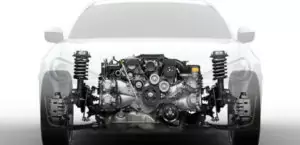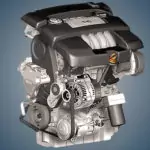The 1.8-liter turbo engine Volkswagen AUQ 1.8T was assembled at the factory from 2001 to 2006 and was installed on models with a transverse engine: Golf 4, Bora, Octavia and Audi A3. This power unit was slightly more powerful than its counterparts in the series, developing 180 hp and 235 Nm.
The EA113-1.8T series includes: AGU, AWT, AMB, AWM, AUQ, AWC.
Specifications
| Production years | 2001-2006 |
| Displacement, cc | 1781 |
| Fuel system | injector |
| Power output, hp | 180 |
| Torque output, Nm | 235 |
| Cylinder block | cast iron R4 |
| Block head | aluminum 20v |
| Cylinder bore, mm | 81 |
| Piston stroke, mm | 86.4 |
| Compression ratio | 9.5 |
| Features | DOHC |
| Hydraulic lifters | yes |
| Timing drive | chain & belt |
| Phase regulator | yes |
| Turbocharging | KKK K03s |
| Recommended engine oil | 5W-30 |
| Engine oil capacity, liter | 4.5 |
| Fuel type | petrol |
| Euro standards | EURO 3/4 |
| Fuel consumption, L/100 km (for VW Golf 2002) — city — highway — combined |
10.9 6.3 8.0 |
| Engine lifespan, km | ~300 000 |
The engine was installed on:
- Audi A3 1 (8L) in 2001 – 2003;
- Audi TT 1 (8N) in 2001 – 2005;
- Seat Leon 1 (1M) in 2001 – 2005;
- Seat Toledo 2 (1M) in 2001 – 2004;
- Skoda Octavia 1 (1U) in 2001 – 2006;
- Volkswagen Bora 1 (1J) in 2002 – 2005;
- Volkswagen Golf 4 (1J) in 2001 – 2003.
Disadvantages of the VW AUQ engine
- The main reason for the unstable operation of the engine is the constant air leakage through the crankcase ventilation;
- Numerous branch pipes of the crankcase ventilation system simply crack;
- A low resource has a hydraulic chain tensioner, which plays the role of a phase regulator here;
- Often there are leaks of antifreeze from the tee of the cooling system and failures of the coolant temperature sensor;
- Ignition coils with built-in switches fail very quickly.






